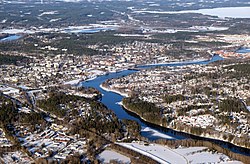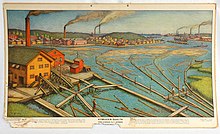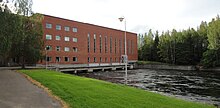You can help expand this article with text translated from the corresponding article in Finnish. (June 2023) Click for important translation instructions.
|
| Kymi | |
|---|---|
 Kymi river in Kouvola. Kymi river in Kouvola. | |
| Native name | |
| Location | |
| Country | Finland |
| Physical characteristics | |
| Source | |
| • location | Päijänne |
| • elevation | 78.2 m (257 ft) |
| Mouth | |
| • location | Baltic Sea |
| Length | 204 km (127 mi) |
| Discharge | |
| • average | 283 m/s (10,000 cu ft/s) |
The Kymi (Finnish: Kymijoki, Swedish: Kymmene älv) is a river in Finland. It begins at Lake Päijänne, flows through the provinces of Päijänne Tavastia, Uusimaa and Kymenlaakso, and discharges into the Gulf of Finland. The river passes the towns of Heinola and Kouvola. The town of Kotka is located on the river delta. The length of the river is 204 kilometres (127 mi), but its drainage basin of 37,107 square kilometres (14,327 sq mi) extends to almost 600 kilometres (370 mi) inside the Tavastia, Central Finland, Savonia and Ostrobothnia. The furthest source of the river is Lake Pielavesi, its furthest point being some 570 kilometres (350 mi) from the sea measured by flow route. The name of the river, itself, kymi, means "large river", in Old Finnish.




Being one of the largest rivers in Southern Finland, the Kymi is a major source of hydroelectricity. The towns of Kotka, Kuusankoski, Myllykoski and Inkeroinen along the river are major centres of the pulp and paper industry. Formerly the river was extensively used for timber rafting.
The Kymi has five mouths. It divides into two main branches near the Kultaankoski rapids in Kotka, about 15 kilometres (9 mi) inland of the Gulf of Finland. The eastern branch splits into the Korkeakoski and Koivukoski branches, the latter branch dividing again to form two mouths (Langinkoski and Huumanhaara). The Korkeakoski branch has only one river mouth.
The western branch divides into Ahvenkoski and Klåsarö branches, each with one mouth.
The westernmost Ahvenkoski branch of the river served as part of the border between Sweden and Russia from 1743 to 1809, and between the Grand Duchy of Finland and the rest of Russia from 1809 to 1812. The parts of Finland east of the river were later called Old Finland. Old Finland was incorporated into the Grand Duchy of Finland in 1812.
The Kymi is very swift: it takes three days for its waters to run from lake Pyhäjärvi to sea. Its mean depth is 9 metres (30 ft), and the deepest place is 29 metres (95 ft).
Hydroelectric plants and rapids

In Kymijoki, there are 12 hydroelectric plants and several dams to regulate the water level. The first power plants were built is 1882. The canal and dam at Kalkkinen is used to regulate the water level of Lake Päijänne. The Hirvivuolle Dam regulates water flow between eastern and western branches. The Paaskoski Dam near Tammijärvi regulates the flow into the Klåsarö branch and the Strömfors Dam regulates the water level of the Strömfors industrial area.
Upper and middle reaches:
- Kalkkistenkoski rapids and regulating dam (Asikkala)
- Jyrängönkoski rapids (Heinola)
- Vuolenkoski, hydroelectric plant (Iitti)
- Mankala, hydroelectric plant (Iitti)
- Voikkaa, hydroelectric plant (Kouvola)
- Pessankoski rapids (Kouvola)
- Lappakoski rapids (Kouvola)
- Kuusankoski, hydroelectric plant (Kouvola)
- Keltti, hydroelectric plant (Kouvola)
- Myllykoski, hydroelectric plant (Kouvola)
- Anjalankoski (Ankkapurha), hydroelectric plant (Kouvola)
- Piirteenkoski rapids (Kouvola)
- Susikoski rapids (At the boundary of Kouvola and ja Kotka)
- Ahvionkoski rapids area, elevation 1,9 m (At the boundary of Kouvola and Kotka)
- Kultaankosket rapids, elevation 1,5 m (At the boundary of Kouvola and Kotka)
Western branch:
- Hirvivuolle, regulating dam, built in 1933 (Pyhtää)
- Hirvikoski rapids (Pyhtää)
- Paaskoski, regulating dam, built in 1933(At the boundary of Pyhtää and Loviisa)
- Klåsarö (Loosarinkoski), hydroelectric plant (Pyhtää)
- Ediskoski, hydroelectric plant (Pyhtää)
- Strömfors, regulating dam, built in 1965 (Loviisa)
- Ahvenkoski, hydroelectric plant (At the boundary of Pyhtää and Loviisa)
Eastern branch:
- Pernoonkosket rapids area, elevation 5 m (Kotka)
- Laajakoski rapids (cleared away, Kotka)
- Koivukoski, hydroelectric plant and regulating dam (Koivukoski branch, Kotka)
- Siikakoski rapids (Koivukoski branch, Kotka)
- Kokonkoski rapids (Koivukoski branch, Kotka)
- Langinkoski rapids (Langinkoski branch, Kotka)
- Hinttulankoski rapids (Huumanhaara branch, Kotka)
- Korkeakoski, hydroelectric plant (Korkeakoski branch, Kotka)
See also
- Kymi, former municipality of Finland
- Langinkoski, rapids on the river
References
- "Yleistietoa Kymijoesta". Ymparisto. 8 December 2017. Retrieved 28 June 2020.
- Hoikkala, Ulla (9 February 2020). "Kymijoki - sykkivä valtasuoni". Kymisun. Retrieved 28 June 2020.
- Sairo, Laila (25 June 2017). "Kymijoki oli kahden vallan välissä 70 vuoden ajan — rantojen asukkaiden välille muodostui 11 päivän aikaero". Kouvolan Sanomat. Retrieved 28 June 2020.
External links
[REDACTED] Media related to Kymi River at Wikimedia Commons
- (in Finnish) Kymi river
60°29′25.81″N 026°27′08.82″E / 60.4905028°N 26.4524500°E / 60.4905028; 26.4524500
Categories: